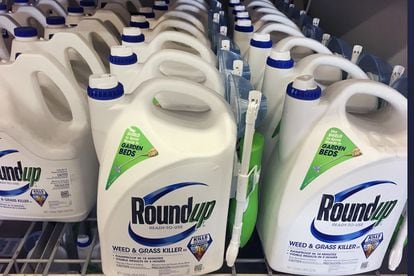Pressure from the agrochemical industry for Mexico to reverse its decision to ban glyphosate has achieved a first victory.
A judge has agreed with Monsanto in the legal battle it waged in early April against the decree that seeks to end the pesticide and has granted the company a provisional suspension that allows it to continue marketing it until the lawsuit is resolved.
Judge Francisco Javier Rebolledo argues in his decision of April 15 that, if the suspension is not granted, "there would be a risk that the disuse of glyphosate and genetically modified corn would affect agri-food production." The judge is expected to issue a final ruling on May 7. In any case, the suspension applies only to the company - now owned by Bayer - and not to the sector as a whole.
The Ministry of the Environment (Semarnat) announced on Monday that it has appealed the ruling and harshly criticized Monsanto's offensive to avoid the ban on the herbicide. "Semarnat will always be firm and with the necessary elements to defend the Decree against the tricks and interests of individuals that threaten life and the right to a healthy environment for Mexicans," said the agency in a statement.
In an unprecedented step in Latin America, the Mexican government decreed on December 31 a ban on glyphosate and transgenic corn by 2024 because the most widely used pesticide in the world has "harmful effects" on people's health and the environment. . Mexico thus followed in the footsteps of a growing list of countries that have taken action after the World Health Organization classified glyphosate as a "probable carcinogen" in 2015.
However, Monsanto insists on the safety of its flagship product.
The firm patented it in 1974 under the Roundup brand and, after being forced to pay multimillion dollar lawsuits for cancer cases, it has become a symbol of the evils of agribusiness.
"Glyphosate is safe and is supported by hundreds of scientific studies," said the company in a statement, which did not agree to the requests for an interview from this newspaper, claiming that it is an ongoing legal process.
Containers of Roundup, the brand name Monsanto markets glyphosate under.Scott Olson / Getty
The amparo lawsuit initiated by Monsanto is part of a broad agribusiness effort to stop the intentions of the Mexican government. In fact, Monsanto's is the tenth amparo filed against the presidential decree, although it has been the only one that has prospered in court. In addition, at the beginning of the year, the pressures exerted by various United States ministries for Mexico to desist from its intentions to ban glyphosate became known.
According to the documents obtained through a request for transparency filed by the US organization Center for Biological Diversity, the US ministries of Economy, Environment and Agriculture contacted their counterparts in Mexico "to pressure and try to weaken or reverse ”the decree, explains the scientist of that organization Nathan Donley. Behind it is "a chemical industry with enormous influence" on American politics.
From Sin Maíz No Hay País they know well the history of Monsanto's litigation in Mexico. The campaign, made up of more than 300 organizations, has been fighting the company for more than a decade to prevent the spread of transgenic corn in Mexico, which endangers the native varieties of that grain. And they know that beating them is possible. In 2013, they managed to get the Mexican Justice to suspend the planting of transgenic corn. Monsanto also lost the legal battle against the movement of Mayan beekeeper Leydy Pech, who managed to have her transgenic soy permits revoked in seven states of the country.
"Monsanto has impressive power and the possibility of accessing these justice mechanisms and positioning its interests," says Javier Zúñiga, a lawyer for El Poder del Consumidor, one of the organizations that is part of Sin Maíz No Hay País.
"But thanks to the mobilization carried out by civil society and indigenous communities, historic victories have been achieved."
Now he just hopes that this new onslaught by Monsanto can be stopped once again in court.
Subscribe here
to the
newsletter
of EL PAÍS México and receive all the informative keys of the current situation of this country

